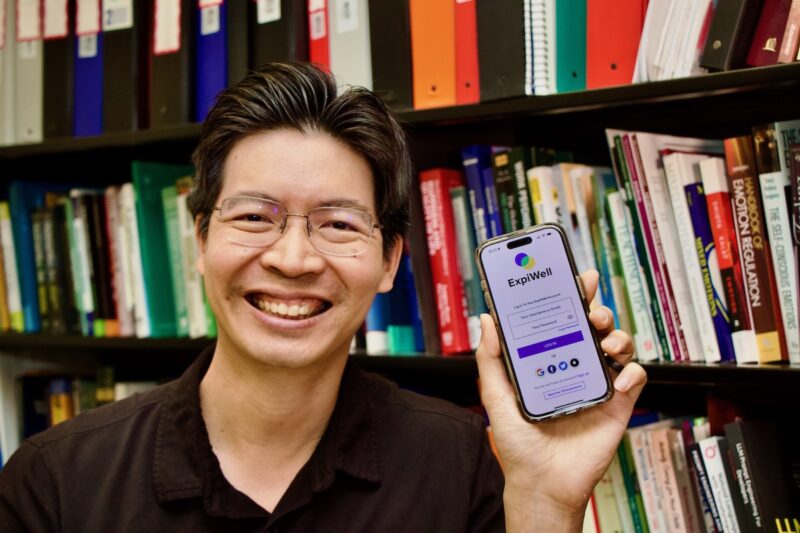Purdue Psychological Sciences professor’s app enhances research experiences nationwide, one survey at a time

Louis Tay, the William C. Byham Professor of Psychological Sciences, holds his phone to show the welcome screen of ExpiWell, an app that aids in research surveys and other responses from participants during a study. The app has been downloaded more than 5,000 times.Tim Brouk
Written by: Tim Brouk, tbrouk@purdue.edu
Getting human participants to engage and respond to survey questions and requests in research studies has always been a challenge for social scientists.
Louis Tay, the Purdue University William C. Bynam Professor of Psychological Sciences, was not satisfied with data culled from computer-based online surveys during his first years in the College of Health and Human Sciences. Sitting at a computer to complete long surveys could be a struggle, and the findings could have benefited from “real-time” and “real-world” responses.
Tay took this problem head-on by teaming with Purdue computer science students to create an app that participants can interact with while on the go. About a decade later, ExpiWell has been used by more than 5,000 participants worldwide and has seven employees worldwide.
“As a methodologist by training, I’m very interested in enhancing the ways to capture the human experience,” Tay said. “We really need to be able to gather richer data from people. With smartphones and sensors, we can collect so much more, but there wasn’t really anything out there. … Social science is moving away from one-shot surveys because we recognize the significant limitations. We want lived experiences over time through daily short surveys along with multimedia and sensing data.”
Merging his interests in technology and well-being, Tay started a company for ExpiWell with the help of the Purdue Research Foundation. His developers are constantly updating and improving their mobile apps, keeping them current with features such as sensing technology. ExpiWell syncs up with wearable technology, such as Fitbit and Apple Watch, measuring heart rate and steps. It enables researchers to capture location, photos, voice and videos. The app was featured July 23 on Google’s #WeArePlay U.S. campaign, a site that features Google Play apps and app-builders from around the United States.
There are a variety of ways ExpiWell’s real-time assessments can be used. During COVID-19, Tay noted ExpiWell was the go-to app for helping Purdue student ambassadors centrally share compliance with COVID-19 restrictions in real time.
It can even monitor alcohol use for binge drinking studies.
“With wearable integrations, researchers like Catharine Fairbairn from the University of Illinois, are able to track when people are drinking,” Tay said.
When connected to a BACtrack SKYN biosensor, which estimates blood alcohol content by measuring alcohol emitted through the skin, it can notify researchers if the participant is binge drinking.
Of course, the participants in studies of alcohol use are willing partners. The app can be linked to supporters whom they could call or text when the user drinks and is then tempted to drive, perhaps saving the life of the participant and other motorists. This ability for just-in-time adaptive interventions is one of Tay’s favorite new aspects of ExpiWell.
“Right now, we are very interested in extending that to intervene, to have the app send notifications to supporters (friends and/or family) at the right time,” Tay said.
Tay mentioned that a health network in Canada recently subscribed to ExpiWell for cognitive ability fluctuation testing for participants via daily burst surveys, also known as experience sampling or ecological momentary assessments.
“It allows social scientists to really have an in-depth look at how people are living their lives, what they’re experiencing in the moment,” Tay summarized. “It goes beyond ‘Oh, I’m going on my computer and responding to a general survey about my life.’”
Tay foresees artificial intelligence (AI) as the next step for ExpiWell, especially in the form of chatbots that promote well-being. The bots could help with participants’ questions and concerns while also acting like digital research assistants during a project.
“I think that technologists and social scientists need each other,” said Tay, revealing he’s already applied for grants to research AI’s potential role in promoting human well-being. “The wicked problems of our society are interdisciplinary and require multiple perspectives. You can’t just expect a computer scientist to design a bot that is going to be a counselor or clinician and vice versa. So, I think we need each other, and the best work comes when we collaborate.
“The beauty of being here at Purdue is we have excellent social scientists, engineers, and computer scientists. We hope that more engineers will consider working with social scientists and psychologists when they think about ways to use AI and technology for good.”
Susan South, professor of psychological sciences and Tay’s departmental colleague, recently used ExpiWell for her Alzheimer’s disease research.
“Expiwell was perfect for the study because it is meant to be used through an app on a tablet, which is what our participants are doing,” South said. “Louis and his team have been incredibly responsive, and they’ve developed new capabilities for ExpiWell specifically based on our study’s needs, like customizing response options and linking to a battery of cognitive brain teaser games.”
Discover more from News | College of Health and Human Sciences
Subscribe to get the latest posts sent to your email.